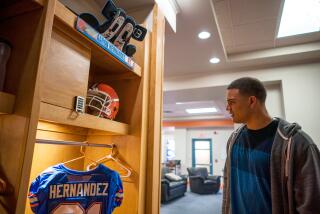Some See Rigged Game in Cuban Baseball Star’s Defection
MIAMI — World Series hero Livan Hernandez has much to smile about as 1998 gets underway.
Minutes before cruising down Biscayne Boulevard on the back of an automobile as grand marshal of the Orange Bowl Parade, the star pitcher of the Florida Marlins learned that his half-brother Orlando, who fled Cuba on a raft and was freed Thursday from a Bahamian jail, would be permitted to enter the United States on a humanitarian visa.
Orlando Hernandez, known as El Duque (The Duke), was himself a standout pitcher before he was kicked off the Cuban national team in 1996, following his brother’s defection in 1995.
But while Livan Hernandez and many in the Cuban exile community here rejoiced over the impending arrival of yet another celebrity defector from the regime of Fidel Castro, others filled Spanish-language talk-radio shows with angry comment over what appears be a double standard in the treatment accorded Cuban refugees.
“It doesn’t seem fair,” said one caller. “Everyone is not treated equally.”
In fact, of the eight people aboard the small wooden boat that the Coast Guard discovered Sunday on Anguilla Cay, just north of the Cuban coast, only Orlando Hernandez, catcher Alberto Hernandez Perez and Noris Bosch, Orlando Hernandez’s 20-year-old girlfriend, were granted asylum, on the basis that they would face persecution if they were returned to Cuba.
Five others who left Cuba on the same crude boat face repatriation by the Bahamian government.
Relatives of Orlando Hernandez expected his arrival soon in Miami. “He has been released. They are free to travel anywhere they wish,” said Joshua Sears, a spokesman for the Bahamas Ministry of Foreign Affairs, after the three had been freed from a detention lockup.
But late in the day, Gerardo Capo, a representative of the Cuban American National Foundation in Nassau, Bahamas, said Orlando Hernandez had decided not to leave the Bahamas before trying to prevent the return of his five raft-mates to Cuba. “The group came together, they risked their lives and went through a great ordeal, and they want to protect each other to make sure everybody is out,” Capo told WSVN-TV in a telephone interview.
“He’s made it very clear he’s seeking asylum for he and all his friends,” Sears said.
Thoughts of the financial future may also be a factor. Were Orlando Hernandez, 28, to establish residency in the Bahamas rather than the U.S., he could avoid the Major League Baseball’s draft in June and negotiate a lucrative free-agent contract with any team.
That’s what Livan Hernandez did. From the Dominican Republic, he signed a $4.5-million, four-year contract with the Marlins.
“The Marlins must sign him,” the 22-year-old Livan said of his brother. “I’m going to hug him . . . and let him know that he has to move forward in his life and become a star player in the big leagues.”
Even as Atty. Gen. Janet Reno was deciding El Duque’s fate earlier this week, there were predictions that Orlando Hernandez would join his brother among the ranks of instant sports millionaires. Some observers predicted a bidding war would break out among major league clubs hoping to sign the pitcher and catcher who fled together.
Last fall, as Livan Hernandez was knocking down Cleveland Indian batters on his way to being named the World Series’ most valuable player, U.S. television networks sent crews to Cuba to interview Orlando, who many said was a better pitcher than his brother.
The contrast between Orlando’s own impoverished straits and his brother’s professional and financial success could not have been greater. After Livan’s defection and his subsequent banishment from baseball, the elder Hernandez had been working as a sports trainer in a Havana psychiatric hospital, earning the equivalent of $10 a month.
Since the U.S. signed an immigration accord with the Cuban government in 1994 to end an exodus of rafters, very few Cuban defectors have been permitted into this country. When stopped at sea, almost all Cubans attempting to flee the island are repatriated.
“It is not a surprise that Hernandez was allowed in,” said Cheryl Little, a Miami immigration attorney who handles asylum claims. “And I’m glad for him. But cases like this, where preferential treatment is given, create tension in the community. There are many other equally compelling cases which don’t get this attention.”
According to James Foley, a State Department spokesman, Orlando Hernandez met the requirements for asylum because he has family in the U.S. and had suffered reprisals in Cuba. “He has a very strong fear of additional and increased persecution should he be sent back to Cuba, and we’re taking that concern very seriously,” Foley said.
Still, the decision sparked controversy. “Obviously people are going to think this is a case of a celebrity getting a sweet deal,” said Max Castro, a sociologist at the University of Miami’s North-South Center, “even though in this particular case, there is some basis to believe that the guy had been punished and deprived of his livelihood.”
Ninoska Perez, a spokeswoman for the Cuban American National Foundation, said: “We are glad that the baseball players were granted asylum, but we believe the others also should have been granted asylum.”
Even the Bahamian government criticized the U.S. decision. “The morality of this raises concerns,” Sears said, “which is why we insisted that they be treated as a group. I would think the United States would see that side of it too and be more sensitive to it.”
Orlando Hernandez and his companions left Cuba the day after Christmas, shoving off from Holguin province, near the eastern end of the island, in a 20-foot sailboat that almost immediately began taking on water. At a press conference Wednesday in Nassau, he wore a new teal Marlins cap and a Charlotte Hornets warmup jersey as he described his desperation to leave the island after Cuban authorities harassed him at home and in the street.
He said he left two daughters behind in Cuba in order to pursue his dream of joining his brother in the big leagues.
“They forced us to make this decision, which was very risky, but it was the right one for us,” he said. “We want the liberty that God gave us to be treated like people. That’s why we left.”
Alberto Hernandez, 26, who was the starting catcher of the Cuban national team that won the gold medal at the 1996 Atlanta Olympics, said he also was persecuted and barred from baseball because the Castro government feared he would defect.
After about 10 hours at sea, the men said, the fugitives landed on the barren Anguilla Cay and survived the next three days by eating shellfish and the only provisions they brought with them: four cans of Spam and a jug of water. They were spotted by a Coast Guard boat Monday morning.
More to Read
Sign up for Essential California
The most important California stories and recommendations in your inbox every morning.
You may occasionally receive promotional content from the Los Angeles Times.










